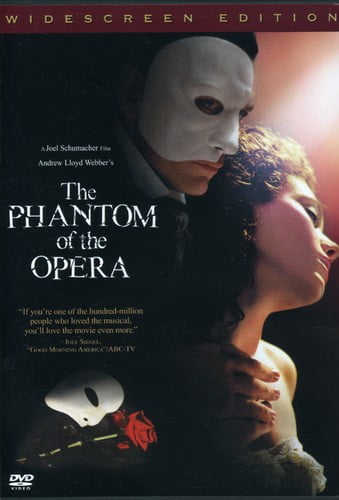

The managers, realising that they have no other alternative, let Christine audition and find themselves dazzled by her exceptional voice. André identifies the name as the same as a prominent deceased violinist, who Christine reveals was her father. As Lefevre departs, Meg Giry, the daughter of ballet mistress Madame Giry, claims her friend Christine Daaé has been taking singing lessons from an unknown teacher and can sing in Carlotta's place. The new managers attempt to downplay the situation, but Carlotta refuses to perform and walks out. When a falling backdrop barely misses resident soprano Carlotta Giudicelli, everyone blames "The Phantom of the Opera," who has troubled them for the past three years. In 1881, the Opéra Populaire's retiring owner, Lefevre, interrupts rehearsals for the grand opera Hannibal to introduce the company to his successors, Richard Firmin and Gilles André ("Hannibal Rehearsal"). The auctioneer presents a restored chandelier as the next item up for bid, noting its connection to "the strange affair of the Phantom of the Opera, a mystery never fully explained." As the mammoth fixture comes to life, the theatre's former grandeur returns ("Overture"). In 1905 Paris, France, during an auction hosted by the defunct Opéra Populaire, the Vicomte Raoul de Chagny purchases a music box an unknown woman told him about, noting it appears just as she described it. In order to enable more people to see the production, the final performance was relayed live to cinemas around the world via Fathom Events.

Tickets for the three performances sold out within five hours of going on sale. The orchestra was elevated on a platform and backed by a screen which the opera sets were projected onto, with LED screens on the lower portions of performance stage. The balconies of the hall were used to build uprights to form an opera house proscenium with boxes on each side.
DVD THE PHANTOM OF THE OPERA 25TH ANNIVERSARY FULL
As a concert hall rather than a theatre, many of the show's elements (such as the chandelier, which instead of falling, exploded) had to be toned down and simplified: the Royal Albert Hall was simply not capable of accepting a show the size of The Phantom of the Opera, or at least not the full original. As a result, the event was planned as a full show.ĭesigning the staged show at the Royal Albert Hall was a daunting task, as the space (or lack thereof) was not an easy one to translate a proscenium show into. Designer Matt Kinley initially planned to hold a concert-style production not unlike the Les Misérables 25th anniversary concert at the O2 Arena, but Mackintosh made it clear the show would be fully staged, as both he and Lloyd Webber felt it would not work unless it was the whole show. The production transferred to Broadway at the Marquis Theatre in 2012 with Elena Roger reprising her role and Ricky Martin as Che.To mark the milestone of 25 years, Andrew Lloyd Webber and Cameron Mackintosh planned a special 3-day production to take place at London's Royal Albert Hall in October 2011. The production ran until May 2007 and was nominated for a number of awards, including a nomination for Elena Roger as Best Actress In A Musical at the 2006 Olivier Awards. The film was nominated for five Academy Awards, winning one for Best Original Song (“You Must Love Me”).Ī revival of the show opened at London’s Adelphi Theatre in 2006, with Argentinean actress Elena Roger as Eva.

A major 1996 film adaptation starred Madonna in the title role and Antonio Banderas as Che. Productions of Evita have been performed all over the world, including performances in Austria, Spain, Mexico and South Africa. In 1981, the Evita cast recording was awarded a Grammy Award.

Evita won an impressive seven 1980 Tony Awards including Best Book, Best Score and Best Musical of the year. The stage production opened on Jat the Prince Edward Theatre in London with Elaine Paige in the title role and Joss Ackland as her formidable Juan Perón.įollowing stints in Los Angeles and San Francisco, Evita premiered on Broadway at the Broadway Theatre on 25th September 1979. Set in Argentina between 1934-1952, the Tony-winning musical follows Eva Duarte on her journey from poor illegitimate child to ambitious actress to, as wife of military leader-turned-president Juan Peron, the most powerful woman in Latin America, before her death from cancer at age 33.Įvita’s memorable “Don’t Cry For Me Argentina” was recorded and released in 1976 followed by the complete rock opera concept album, which went gold. Evita charts the young and ambitious Eva Peron’s meteoric rise to sainthood.


 0 kommentar(er)
0 kommentar(er)
